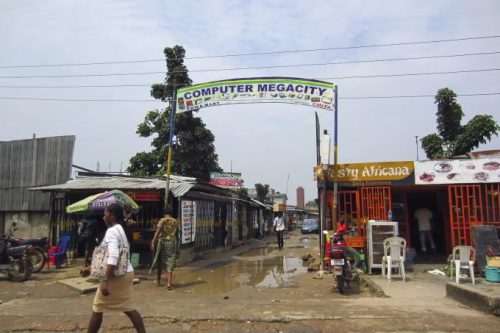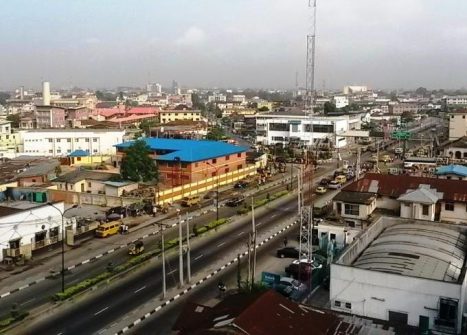Nigeria. Towards an African Silicon Valley.

The Nigerian digital sector was born in an informal economy context and now represents almost a fifth of GDP. An ecosystem with interesting characteristics of decentralisation that, however, is often attempted to be replaced with the model of concentration of investments in California-style technology hubs.
Towards a Nigerian model.
The roots of Nigeria’s interest in technology go back to well before the current digital boom. This sector was born in the 1980s, when in Surulere, in the Lagosian hinterland, young entrepreneurs without much capital began selling, assembling and repairing computers.
A short distance away, in Ikeja, the growing demand for digital devices led, especially from the mid-1990s onwards, to the birth of the Computer Village, a technological market that would eventually encompass over 2,000 businesses. Even today, this market represents a point of reference for anyone in Lagos who deals with technology, especially its physical components, despite its chaos and organisation being part formal and part informal. What initially appeared to be a niche scene, between self-taught technicians and young entrepreneurs returning from abroad, laid the foundations for what is now one of the most dynamic technological centres in Africa.
It was in those years that the first local IT companies appeared, which not only imported foreign computers, but also developed “indigenous” minicomputers and personal computers.

People are walking in the street in front of a commercial area called Computer Megacity in Lagos. iStock/agafapaperiapunta
A distinctive feature of these companies has been their ability to address the country’s structural challenges, offering solutions to its particular problems, such as the discontinuous supply of electricity.
At the beginning of the new millennium, a significant influx of foreign investors, such as the South African telecom giant MTN Group, marked a notable turning point in the Nigerian technology landscape. However, it was in the following decade that the sector underwent a radical transformation, with the initiation of risk capital (or venture capital) activities by foreign companies, especially from the United States, which began to invest in local start-ups.
The impact of these investments positively influenced the national gross domestic product and fuelled the belief that Nigeria was heading towards a new economic renaissance. This “renaissance” is perceived by the country’s elites and now also by the rest of the population as a response to the disappointments of the oil industry, which, despite the initial promises of prosperity, had left the country facing economic crises, unstable governments and widespread poverty.
The birth of the CcHub and Yabacon Valley
In 2010, in the heart of Yaba, located in the hinterland of Lagos, the CoCreation Hub (CcHUB) was born, thanks to three Nigerian entrepreneurs, with different experiences abroad: Bosun Tijani, current Minister of Innovation and Digital Economy, Femi Longe and Adetunji Eleso.

Bosun Tijani is the current Minister of Innovation and Digital Economy. He is one of the founders of the CoCreation Hub (CcHUB). CC BY -SA 4.0/CcHUB
The choice of Yaba is not accidental: in addition to offering accessible costs compared to the richer areas of the city, its proximity to the University of Lagos and the Yaba College of Technology facilitates interaction with students and young talents, thus fuelling the local technological ecosystem.
The presence of the CcHub radically transforms Yaba, soon nicknamed by journalists Yabacon Valley, clearly alluding to the Californian Silicon Valley. The idea, perhaps visionary, of making Yaba an African Silicon Valley began to materialise in 2013, through the I-HQ Project. This initiative combines public and private investments and aims to consolidate Yaba as the epicentre of Nigerian innovation. The project is a collaboration between the CcHub, the Minister of Communications and Technology, Omobola Johnson, and Funke Opeke, CEO of MainOne Cable Company, a pioneer in Internet cabling in Nigeria. In this favourable environment, successful start-ups such as Konga, Paga and Andela have emerged, attracting young talent from all over the country. The CcHub has thus established itself as a meeting point for developers, entrepreneurs and innovators.

Yaba has not been transformed into the Silicon Valley that investors and companies had imagined. CC BY 2.0/T. Obi
Significant episodes enhance Yaba’s reputation: in 2016, Y Combinator, an American accelerator that provides seed funding, guidance and support for young start-ups, organised its first African event in Lagos, followed by visits by Mark Zuckerberg (Facebook) and Jack Dorsey (Twitter, in 2019) to the CcHUB. These circumstances not only drew international attention to Yaba and Lagos but reinforced the idea that tech hubs and accelerators represent the models of technological innovation that Africa, and perhaps the entire world, should follow.
Beyond Yaba: New Frontiers
Despite the ambitious premises, Nigeria’s structural difficulties have ended up hindering the development of Yaba as a technology hub. Government support has diminished, causing problems such as an unstable electricity supply, inadequate roads and poor public services to resurface. As a result, while Yaba has not transformed into the Silicon Valley imagined, investors and companies, especially when successful, have shifted their attention to more affluent areas such as Victoria Island and Ikoyi, able to offer security and a better quality of life.

A team of start-up employees collaborating on a coding project in a modern office. 123rf
At the same time, the Lagosian technological landscape is now extending towards the eastern areas of the city, now beyond the borders of what the population itself would consider Lagos. In areas that are still poorly urbanised, a (still) new African Silicon Valley is being built: Itana, designed with the sole purpose of responding to the needs of those working in the technology sector. Itana will be built as a district within a private residential and micro-industrial complex, Alaro City, in the Lekki Special Economic Zone, offering customs, tax and immigration benefits compared to the usual policies of the Nigerian state. These measures aim to facilitate the entry of Nigerian and international companies interested in the African market.
Although Itana is currently still under construction and operates only virtually, the project aims to act as an intermediary between local dynamics and business activities, allowing investors the possibility of operating remotely throughout the African continent.
Between global narrative and local reality
The aspiration to create a new city, or rather an enclave like Itana, where the entire technology sector can be concentrated, perhaps reflects a narrative that continues to place Western models, particularly that of Silicon Valley, as the main reference of excellence to aspire to. However, this vision contrasts with the historical reality of Lagos, where technology has been a deep-rooted presence for decades.
This approach risks obscuring the pre-existing Nigerian technological heritage and seems to ignore how Gosiano has always been extremely more complex than the recurring narratives of the next, always emerging, African Silicon Valley.

Young engineering students collaborate on an electronics project in a technology lab. To outline the future of tech in Nigeria is complex. 123rf
The local reality instead presents a technological ecosystem that is now rather consolidated, better represented as a decentralised network of innovation nodes, and a mosaic of realities spread and interconnected across the territory. The tendency to forget the past arises from the desire to embrace the new, but the Nigerian historical experience suggests avoiding concentrating all one’s resources in a single sector, and waiting for foreign capital as the only panacea to lift the country. On the other hand, the search for external support, even in the technology sector, reveals a deep-rooted distrust in the government and local institutions. Trying to outline the future of tech in Nigeria is, therefore, complex. If it were short-sighted not to recognise the potential for renewal that this nation could obtain from technological innovation, it would be dangerous not to recognise the risk of following foreign investment models and priorities, however useful they may be in finding some solutions. Without a government capable of directing investments, the risk is that Nigeria will remain a place where the implementation of digital technologies continues to depend on foreign sources and models. Although these investments have indeed produced economically tangible results so far, they also have short-term priorities and deadlines that prevent the search for truly innovative technologies.
The latter would, in fact, require research support that is much more long-lasting than any private start-up accelerator or venture capital could ever provide. (Open Photo: 123rf)
Ahlam Taik and Davide Casciano



